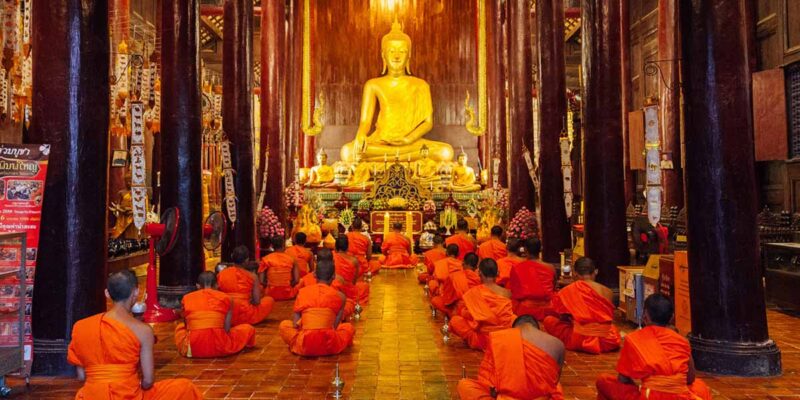During the Buddha’s lifetime his teachings spread only to that part of India known as the Madhya Mandala. This means the central part of India comprising 16 different states, especially the kingdoms of Magadha, Kosala, Vatsa and Avanti. The teachings were confined to this small area until the time of Emperor Asoka in the 3rd century B.C.E. (Before the Common Era). During his reign a great expansion of Buddhism took place.
Wave after wave
The third council was held during his reign and he sent out nine different parties of missionaries. Each mission consisted of five Theras so that it would be possible to perform the upasampada ordination in remote places. In addition to Sri Lanka, missions were sent westwards as far as Syria, and later northwards to Tibet, Mongolia and China. Gradually a large part of the East came to enjoy the beneficial influence of Buddhism. This situation remained largely unchanged until the start of this century when a further expansion took place, this time to the West.
During the latter part of the 19th century and the first few decades of the 20th century, the only westerners who had the opportunity to learn about Buddhism were either scholars or administrative officers of colonial powers who tended to look at it from a purely intellectual point of view. However, the studies and translations made access to Buddhism for westerners much easier. Throughout this time also the growing separation between science and religion led many people to feel alienated from their religious roots and it were such people especially those who came to the East during the Second World War – who began to find in Buddhism an empirical, “scientific” approach to the spiritual life. These were followed by another wave of young westerners in the 1950’s, 1960’s and 1970’s who were actively searching for a spiritual life. They were touched by the lifestyles and ways of worship of Buddhist people and many were so impressed especially by the techniques of meditation that they became Buddhists, and even joined the Sangha. This process continues today through tourism. Such people, on return to the West, have done much to spread the Dhamma even more widely, so that Buddhism is established in almost every western country. There is every reason to believe that this process of expansion will continue into the next millennium and beyond.
The reasons for the popularity of Buddhism are many. People of enquiring minds are attracted to it because of its simplicity and the wide freedom which is encouraged
through Buddhism. There is a welcome lack of dogma and compulsion, an absence of emphasis on notions of punishment and reward. Instead we are taught to accept personal responsibility for all our acts of thought, word and deed. And the meditational techniques give people a strong practice around which to centre their lives.
The West has certainly produced many technological wonders, but the norm seems to be to increase production and consumption endlessly. Both personal tastes and public opinions are subjected to manipulation by the media, desire, greed and craving are stimulated by telling people that this will lead, to their greater happiness. Family ties have become weakened and standards of personal morality have often become eroded. I do not need to go on at length about the problems faced by many Western countries, eventhough it is not all ‘gloom and doom’. However, mankind still experiences dukkha (un- satisfactoriness) and this will always be so. Not even the increasing material affluence enjoyed by many people today will eliminate the experience of dukkha from their lives. The Buddha taught us that the cause of dukka is tanha (craving or thirst) and tanha is every bit as strong in man today as it was 2,500 years ago. In fact, tanha is being constantly fueled by increasing affluence, and so we continue circling round in this samsara (the cycle of birth, death and rebirth). Buddhism has a vital role to play, teaching proper standards of personal morality and a correct attitude towards material wealth.
Basic teachings
Western culture is very different from the Eastern Culture in which Buddhism is embedded, but it is the adaptability of the dhamma to different cultures which has enabled Buddhism to spread so successfully to so many different countries. In fact we have a very interesting situation developing in many countries which are becoming exposed to the Buddha’s teaching for the first time. Traditionally each country was faithful to one particular school of Buddhism to the exclusion of other schools. In the West, however, we find that representatives of many different schools are becoming established in one particular country. Hence newcomers to Buddhism can choose which tradition they prefer to adopt of they can, as in fact a number have already done, create an eclectic school of their own in the hope of attracting an even wider following.
This may well lead to the development of Western schools of Buddhism. This is perfectly in order as long as the school remains faithful to the essential teachings, namely the Four Nobel truths, the Noble Eightfold Path, and the doctrine or Dependent Origination. Dr. Walpola Rahula has written on this subject, “If Buddhism is not adapted to Western culture, it will always remain a tropical plant in a hot-house there, and it is unlikely to grow freely in the natural soil of the land.”
At the same time, however, it is vital that the purity of the Sangha is maintained. Before the Buddha passed away, Venerable Ananda asked whether he would appoint anybody to lead the order of monks after his demise. He said: “No, what I have taught is the teacher.” The Sangha has played a very important role in preserving the Buddha’s teaching throughout the last 2,500 years and it is our responsibility to continue this even today .
The expansion of Buddhism is, of course, to be welcomed because the benefits of the teachings are so profound, but Buddhism is not a missionary religion. It does not seek out converts and it must remain tolerant of other peoples’ points of view. This means that Buddhists must be careful not to criticize or condemn the religious beliefs of others, especially those beliefs which have been established for a long time in countries where Buddhism is a new arrival. In the Buddha’s opinion the denouncing of other faiths was a profitless exercise. He likened it to a man spitting at heaven. It is as a man who looks up and spits at heaven the spittle does not soil the heaven, but it comes back and defiles his own person” (Anguttara Nikaya Vol. I p. 79) We must be prepared and willing to co- operate in establishing sincere interfaith dialogue. True dialogue means listening to the viewpoints of other people and allowing them to hold them without trying to win them over to one’s own vies or trying to “prove” that one’s own beliefs are the only right ones.
Millionaire Upali
Here it is relevant to mention the story of Upali, the millionaire, Upali was a well-known and prominent supporter of Nigantha Nataputta (Jaina Mahavira), Mahavira the founder of the Jain religion, differed with the Buddha in his teachings on the subject of Kamma and he dispatched his disciple Upali to the Buddha in order that Upali might defeat the Buddha in argument on this subject. Now it so happened that during the course of their discussion, Upali became convinced that the Buddha’s point of view was right and he asked the Buddha to accept him as one of his lay followers, Far from hastening to accept him as one, the Buddha counseled Upali to think again saying, “Now, householder, make a proper investigation, Proper Investigation is right in the case of well-known men like yourself”. This surprised and pleased Upali who remarked that other religious sects would have marked the arrival of a prominent, new convert by hoisting flags and beating drums. When he reconfirmed his wishes to follow the Buddha, the Buddha then asked him to continue to respect and give alms to his former teachers, the Jains. It is in this same spirit of tolerance and understanding that we must participate in the expansion of Buddhism in the year ahead.
Reciprocal respect
We Buddhists must also be heedful of being shown similar respect and understanding by followers of other faiths. Because we do not accept the idea of a supreme, creator god or a permanent, enduring soul, followers of other religions sometimes fear Buddhism as a subversive influence which is trying to destroy their existing beliefs.
If we can establish an open and frank dialogue with other religions, we can dispel any misunderstanding and given reassurance that we do not wish to cause friction or anxiety in the minds of others. Even in his own time, the Buddha was aware of the potential dangers of taking a dogmatic approach to other religions. He said that he did not teach simply in order to increase the numbers of his own followers. People may continue to follow the teacher of their own choice. Speaking to Nigrodha the wandering ascetic, he said, “Maybe, Nigrodha, you will think; the Samana Gotama has said this from a desire to get pupils; but you are not thus to explain my words. Let him who is your teacher be your teacher still.”
May be, Nigrodha, you will think; the Samana Gotama has said this from a desire to make us secede from our rule; but you are not thus to explain my words.
Let that which is your rule be your rule still. May be, Nigrodha, you will think; the Samara Gotama has said this from a desire to make us secede from our mode of livelihood; but you are not thus to explain my words. Let that which is your mode of livelihood to be so still. Maybe, Nigrodha, you will think the Samana Gotama has said this from a desire to confirm us as to such points of our doctrines which are wrong, and reckoned as wrong by those in our community; but you are not thus to explain my words.
Let those points in your doctrines which are wrong and reckoned as wrong by those in your community, remain so still for you.
May be, Nigrodha, you will think; the Samana Gotama has said this from a desire to detach us from such points in our doctrines as are good, reckoned as good by those in our community; you are not thus to explain my words. Let those points in your doctrines which are good, reckoned to be good by those in your community, remain so still. “Wherefore, Nigrodha, I speak thus, neither because I wish to gain pupils, nor because I wish to cause seceding from rule, nor because I wish to cause seceding from mode of livelihood, nor because I wish to confirm you in bad doctrines, or detach you from good doctrines. But, O, Negrodha, there are bad things not put away, corrupting, entailing birth renewal bringing, suffering, resulting in ill, making for birth, decay and death in the future.
And it is for the putting away of these that I teach the Dhamma, according to which it ye do walk, the things that corrupt shall be put away, the things that make for purity shall grow and flourish, and ye shall attain to and abide in, each one for himself even here and now, the understanding and the realization of full and abounding insight.: (Digha Nikaya, Vol, IIp. 56)
Equanimity
We should also maintain equanimity when meeting non-Buddhists, no matter what their attitude may be. The Buddha said, “If anyone were to speak ill of me or my teaching, or of my disciples, do not be upset or perturbed. For this kind of reaction will cause you only harm. On the other hand, if anyone were to speak well of me, my teachings and my disciples do not be overjoyed, thrilled or elated, for this kind of reaction will only be an obstacle in forming correct judgement. If you are elated, you cannot judge whether the qualities praised are real and actually found in me, my teachings and my disciples.”
Let us remember the words used by the Buddha when he sent out his first sixty disciples to spread the dhamma. “Go forth, O Bhikkhus, for the good of the many, for the happiness of the many, out of composition for the world for the good, benefit and happiness of gods and men. Let not two go by one way.
Preach, O Bhikkhus the Dhamma, excelled in the beginning, excellent in the middle, excellent in the end, both in the spirit and in the letter.
Proclaim the holy life, altogether perfect and pure.” (Mahavagga, p. 19-20)
It is only through Buddhism that peace of both the individual and of the majority can be secured. Let this be our aim for the next millennium.
By Ven. Dr. Medagama Vajiragnana Sangha Nayaka thero of Great Britain and Viharadhipati, London Buddhist Vihara




